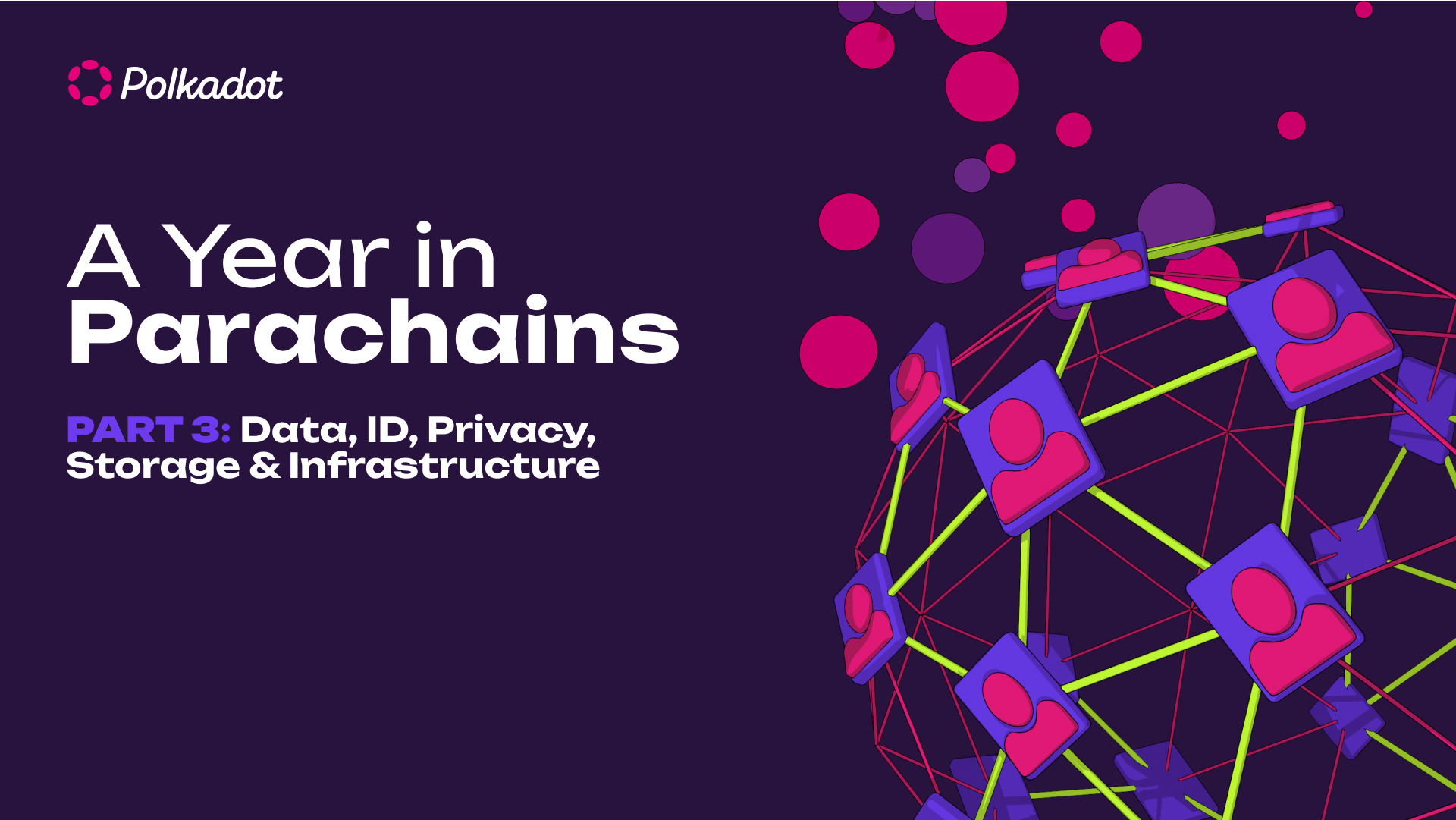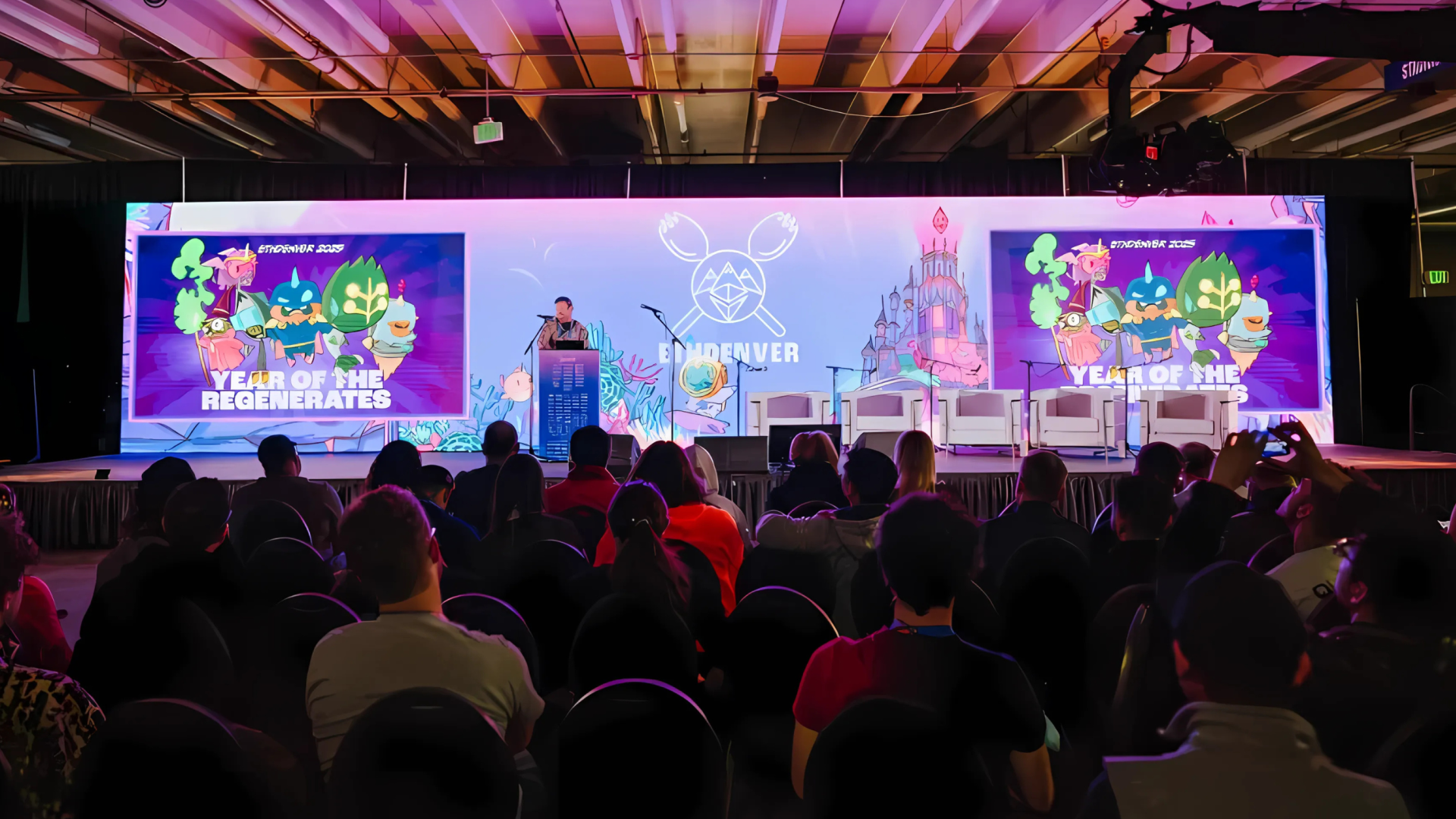A Year in Parachains, Part 3: Data, ID, Privacy, Storage, & Infrastructure
Providing a brief overview of Polkadot's parachain landscape in its first full year since launch. Part 3: Data, ID, Privacy, Storage, and Infrastructure
 By Polkadot•February 28, 2023
By Polkadot•February 28, 2023
It’s been just over a year since parachains first launched on Polkadot, and already the network boasts the largest ecosystem of use-case specific blockchains in the world. Since the first slot auctions took place in November 2021 and the first parachains began onboarding to the network the following month, 39 parachains have joined Polkadot, with an additional 43 parachains on Polkadot’s canary network, Kusama, for a total of 82 across the Polkadot ecosystem.
Over the past year, Polkadot’s first parachains have been busy rolling out and upgrading their technologies, demonstrating the power and flexibility that Polkadot provides with the parachain model, which gives teams a competitive advantage by enabling them to fully customize their own layer-1 blockchain in the optimal way for their use case, with industry-leading upgradeability and interoperability capabilities.
Showing the potential of Web3 to fuel innovation across a wide range of use cases, Polkadot’s ecosystem of parachains is now buzzing with activity across DeFi, smart contracts, social media, decentralized identity, IoT, gaming, the metaverse, sustainability, and more.
This series of posts provides a brief overview of Polkadot’s parachain landscape in its first year since launch, starting in Part 1 with a look at Polkadot’s DeFi (Decentralized Finance) parachains, and continuing in Part 2 with a look at Polkadot’s system parachains, smart contract, and social media parachains. In Part 3, we dive into Polkadot’s parachains related to data, identity, privacy, storage, and infrastructure, featured in the order that they won a parachain slot auction.
Polkadot’s data, storage, privacy & infrastructure parachains
Data is the currency and foundation of today’s internet, representing a resource more valuable than gold. The shortcomings of Web2 in respecting and protecting data from misuse and theft were a significant catalyst for the Web3 vision, so it comes as no surprise that Polkadot parachains are addressing these fundamental concerns.
Polkadot’s data, storage, privacy and infrastructure parachains are helping make a better web the reality, unlocking fairer and more user-centric modes of creating, storing, processing, contextualizing, and transmitting data and transactions for end users, businesses, and organizations. These projects are enabling a web where data ownership, control, and privacy are handed back to the user, all the while improving the standards of service available and bringing several efficiencies over Web2 systems.
PHALA
Auction 13: March 11th, 2022
Phala is a next-generation decentralized cloud computing network built to power Web3 with security, scalability, and cost-effectiveness at the heart of its offering, designed to bring decentralized compute cloud to the masses.
Users are able to purchase computing power from node operators who provide resources to the network. By tapping into Trusted Execution Environments (TEEs) within modern computer CPUs, node operators cannot see or tamper with data stored on their machine, ensuring data privacy. Phala’s Turing-complete smart contracts reinforce the protection of managed programs on the network, and are complemented by an off-chain programming model dubbed the “Phat Contract”, a software for Web3 backends. Phat Contracts are inexpensive, have zero latency, offer privacy and a serverless SDK, and can maintain high-end computation across multiple services without congesting the blockchain.
In addition to Phat Contract, Phala also launched PhalaWorld in 2022, a digital experience showing a user’s progression on the Phala Network based on soul-bound NFTs. Over the past year since launch, Phala has gone from several hundred off-chain computation workers to nearly 20,000 running over 140,000 virtual CPUs.
ORIGINTRAIL
Auction 17: Onboarded June 4th, 2022
Knowledge graphs are database structures that form a fundamental component of the internet as we know it today, representing the relationships that exist between data, real-world entities, events, and concepts, and powering some of the most highly adopted services, from Google Search to Wikipedia. But the centralization of today’s knowledge graphs brings several shortcomings, including siloed data, a lack of transparency, and the inability for data owners to have sovereignty over their data.
OriginTrail is the world’s first Decentralized Knowledge Graph (DKG), addressing many of these issues and bringing knowledge graph technology into the age of Web3. With the OriginTrail parachain, anything from supply chain data, consumer goods or digital collectibles can be evolved into discoverable and verifiable Web3 assets on Polkadot, driving transparency and trust in the global economy.
Already, over 40% of US imports are enabled with OriginTrail technology to foster secure exchange of security audits, with companies using the platform accounting for $1.5 trillion in purchasing power. OriginTrail is also being used to bring visibility and trust to pharmaceutical supply chains, having helped distribute medicine to over 30,000 patients in India in 2022, with rollout taking place in an additional 40 countries.
DARWINIA
Auction 21: Onboarded August 28th, 2022
Establishing interoperability between blockchains from the ground up is something that many networks and solutions have struggled to achieve, or at least securely maintain for significant periods of time.
Darwinia is a cross-chain protocol and smart contract platform that aims to be a hub for cross-ecosystem bridges on Polkadot, with bridges for connecting the ecosystem to networks like Ethereum and Cosmos. Darwinia provides a light-client-based universal cross-chain messaging infrastructure for decentralized applications.
Many cross-chain bridges aren’t interoperable from the ground up and are often temporary solutions to network congestion and steep transaction fees. Leveraging Substrate/Polkadot, Darwinia is natively interoperable, bringing trustless cross-chain token swaps, exchange and market functions to users. With Darwina infrastructure single-chain applications (DeFi, DEX, GameFi, etc.) are able to upgrade to cross-chain versions, broadening their capabilities.
INTEGRITEE
Auction 23: Onboarded August 28th, 2022
Given that Web3 is largely a response to the failures and the abuses of user data in the Web2 era, the processing of sensitive business and personal data is of the most important topics in the space. Integritee leverages the speed and confidentiality of trusted execution environments (TEEs) to power a new generation of decentralized, privacy-first data services.
Integritee combines the security and trust of blockchain with the speed and power of enterprise hardware, enabling companies and developers to leverage the public auditability of blockchain technology while also processing sensitive private data in B2B and B2C interactions. Firms can process sensitive data in pre-agreed ways, and data can be used by an application without it being stored on-chain or being directly accessible to anyone other than its owner.
The applications of this technology are broad, from supply chain management to healthcare use cases and private messaging. Integritee also provides a platform for developers to build dapps that benefit from speed and verifiable privacy, including an SDK for trusted execution and sidechain deployment.
KYLIN NETWORK
Auction 25: Onboarding August 28th, 2022
Kylin Network provides multi-level oracle architecture for on/off-chain data streams. Built to democratize data infrastructure and the oracle creation process, Kylin aims to power DeFi and Web3 with the diverse and expansive decentralized data infrastructure it requires.
Kylin provides a free and open marketplace for the cost-effective, accurate, and reliable on- and off-chain data streams that Web3 platforms and applications need, and serves several blockchain use cases, including market data, navigation, and weather. In addition to rolling out their core multi-level oracle infrastructure technology in 2022, Kylin has initiated several partnerships across the Polkadot ecosystem and beyond, including with parachains Astar Network, Centrifuge, Bifrost, and Equilibrium.
CRUST
Auction 30th: Onboarded November 21st, 2022
Cloud technologies are the backbone of the Web2 era, powering a majority of online services and platforms. However, there are a number of limitations and inefficiencies with centralized systems, including cost, security, and data integrity.
Crust is a decentralized storage (dStorage) and computing platform for the Web3 era. Users are incentivized to rent out idle space on their devices to the network, serving a broad set of everyday users and developers who are given total control over their data. It leverages a number of advanced technologies to ensure low-cost, energy-efficient, and secure cloud services.
Crust presently boasts a capacity of over 500k TB across more than 1,200 storage nodes, and has fulfilled almost 2 million storage orders with a real-time storage fee that is fractions of a penny per GB of data stored. Beyond launching cross-chain storage solutions and developer kits for blockchains both within and external to Polkadot, Crust also launched Crust Files in 2022, described as a fully decentralized “Dropbox-style” application for personal Web3 cloud storage.
ALEPH ZERO
Auction 38: Onboarded February 13th, 2023
Aleph Zero is a scalable, privacy-preserving blockchain built on zero-knowledge technology, offering builders to create smart contract applications with fast time to finality. The goal of Aleph Zero is to make it possible for businesses and enterprises to communicate at the speed they would expect with Web2 software while still leveraging the benefits of decentralization.
Designed for a range of enterprise, Web3, and DeFi use cases, Aleph Zero leverages an integration with the Substrate blockchain framework and is using its parachain slot to bridge its independent solo-chain to the Polkadot ecosystem. By leveraging Aleph Zero, businesses can interact with each other in a trustless manner efficiently and cheaply while still maintaining their own private network.
MANTA NETWORK
Auction 39: Onboarded February 13th, 2023
Manta Network is a privacy-focused parachain powered by zero-knowledge proofs. Leveraging Polkadot’s cross-chain interoperability standard, XCM, Manta offers plug-and-play privacy features to the entire Polkadot ecosystem, a key component of building a better, more secure web that keeps sensitive information private.
Beyond token transactions, Manta’s technology can be applied for a range of Web3 use cases, from metaverse to NFTs, gaming, DeFi, and more.
Manta made headlines in recent months for breaking the record for the world’s largest trusted-setup ever, a process that contributes to the security of zero knowledge systems. Spanning 177 countries and featuring over 13,000 registrations and over 4,300 contributions, Manta’s record-breaking setup helps give it the strongest security guarantees in the space.
Polkadot’s identity parachains
Decentralized identity services are one of the core use cases of Web3. In the Web2 era, our digital identities are fragmented across every online service we use, and are controlled by the platforms we use rather than by us. This leaves our personal data vulnerable to hackers and the centralized companies that own, control, and monetize our sensitive data. An ever-growing number of companies and institutions have demonstrated their inability to keep our sensitive private data safe.
Still, most everyday internet users probably don’t think twice about what happens behind the scenes when they log into their favorite web services. In reality, the usernames and passwords we use to unlock our most sensitive data and assets are being held by each service provider we interact with, often under less-than-ideal security conditions. Fraud, identity theft, extortion—the consequences of managing authentication in this way can often be catastrophic. What’s needed are Web3 alternatives that protect our interests while providing the same user experience we're accustomed to today.
LITENTRY
Auction 15: Onboarded June 4th, 2022
Litentry is a cross-chain decentralized identity (DID) platform that securely aggregates user data from multiple blockchain networks and off-chain applications to create a singular DID that functions across the entire Web3 ecosystem. Litentry prioritizes privacy and security for their users, as well as cross-platform compatibility. Through Litentry, users can access multiple platforms and services across a multitude of use cases and applications.
Litentry has created several products and services such as the Polkadot Name System (PNS), which provides users a unique on-chain name that connects their wallets, tokens, URL, smart contract addresses, and so on.
In 2022 Litentry merged MyCryptoProfile (MCP) and Drop3, two of their flagship products, into a singular streamlined solution called Identity Hub. This brings the Web3-to-Web3 identity linking offered by MCP together with Drop3’s on-chain credit and reputation protocol under one roof. In addition, Litentry has begun implementation of privacy-services powered by a trusted execution environment sidechain with support from Integritee.
KILT
Auction 24: Onboarded August 28th, 2022
KILT Protocol is a blockchain identity protocol for self-sovereign credentials and decentralized identifiers (DIDs), serving both end users and enterprises. For enterprises, KILT unlocks new business opportunities, marketplaces, and revenue streams around digital identity and data sovereignty. For end-users, KILT enables self-control of digital identity and credentials, with a dedicated wallet and several additional services.
Since online service providers don’t need to know everything about their users to provide a service, KILT enables users to choose which personal information they want to share and decide how it gets used. SocialKYC, a service for proving control of an email address and social media accounts, DIDsign, a decentralized way to sign and timestamp any digital file, and web3name, a naming service for representing your Web3 ID, are three KILT services that users can try today.
In 2022 KILT launched several impactful partnerships, including with Germany’s ministry of energy to provide vital services demonstrating how blockchain can be used in a highly-regulated industry. Originally launched on Kusama, KILT became the first parachain to migrate from Kusama to Polkadot in October 2022.
Kusama Parachains
Beyond the parachains currently on Polkadot, an additional 43 have joined Kusama, Polkadot’s canary network. Kusama is where brilliant builders come to innovate, providing a live, value-bearing environment for teams to battle-test their technologies and mitigate risk, build a community, and develop partnerships before a production deployment to Polkadot, or to build and iterate more experimental use cases.
Current use cases on Kusama generally mirror those on Polkadot, with an added focus on DAOs (Decentralized Autonomous Organizations) and Artificial Intelligence:
Many teams maintain a parachain on both Polkadot and Kusama, using Kusama to battle-test new technologies before rolling out upgrades to their Polkadot mainnet.
What’s Next?
Despite the difficult year for blockchain in 2022, the Polkadot community and ecosystem delivered several key innovations over the past year, and now boasts the largest ecosystem of layer-1 chains, with over 300 decentralized applications already built on top of them, as well as the largest community of full-time developers outside of Ethereum.
With a ton of new projects in the pipeline, new parachains will continue rolling out over the next year and beyond, and existing parachains will continue building on their recent successes, rolling out new technologies and onboarding a new wave of Web3 end-users.
Several key technologies are also in development for Polkadot, which will push the capabilities of parachains and dapps even further, including trustless interoperability with external networks with the rollout of XCM v3 and the Bridge Hub parachain. With everything that’s happening in the Polkadot ecosystem, 2023 is shaping up to be the biggest year yet for Web3 innovation.
Read Part 4: Part 4: Sustainability, IoT, NFTs, Gaming, & Metaverse
Interested in developing for or building on Polkadot? Get in touch for hands-on support.











